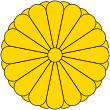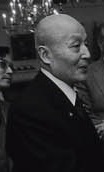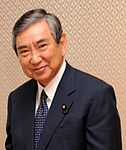
The politics of Japan are conducted in a framework of a multi-party bicameral parliamentary representative democratic constitutional monarchy whereby the Emperor is the ceremonial head of state and the Prime Minister is the head of government and the head of the Cabinet, which directs the executive branch.

Kakuei Tanaka was a Japanese politician who served in the House of Representatives from 26 April 1947 to 24 January 1990, and as the 40th Prime Minister of Japan from 7 July 1972 to 9 December 1974.

Takeo Fukuda was a Japanese politician and the 42nd Prime Minister of Japan from 24 December 1976 to 7 December 1978.

Ryutaro Hashimoto was a Japanese politician who served as the 82nd and 83rd Prime Minister of Japan from 11 January 1996 to 30 July 1998. He was the leader of one of the largest factions within the ruling LDP through most of the 1990s and remained a powerful back-room player in Japanese politics until scandal forced him to resign his leadership position in 2004. Disgraced, he chose not to stand in the general election of 2005, and effectively retired from politics. He died on 1 July 2006 at a Tokyo hospital.

Nobutaka Machimura was a Japanese politician. He was a member of the House of Representatives of Japan and a member of the Liberal Democratic Party. He was Chief Cabinet Secretary in the government of Prime Minister Yasuo Fukuda from 2007 to 2008 and twice Minister for Foreign Affairs, in the cabinets of Junichiro Koizumi and Shinzō Abe. He resigned as the Speaker of the House of Representatives on 21 April 2015 after suffering from a stroke.
Koichi Kato was a Japanese politician who held a seat in the House of Representatives in the National Diet for 13 terms between 1972 and 2012 as a member of the Liberal Democratic Party. After losing his seat at the December 2012 general election, his daughter Ayuko Kato regained the seat for the LDP at the following election. His father, Seizo Kato, also sat in the House of Representatives for five terms between 1952 and 1965.
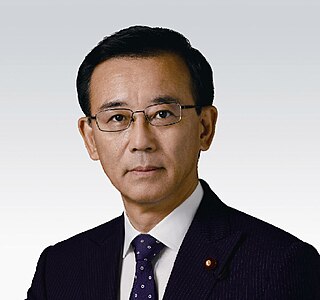
Sadakazu Tanigaki is a Japanese politician who served as Minister of Finance from 2003 to 2006 in the cabinet of Jun'ichirō Koizumi. He also served as Minister of Construction and Transport in the cabinet of Yasuo Fukuda and served his ninth term as a member of the House of Representatives, representing Kyoto's Fifth District. He was elected as President of the Liberal Democratic Party (LDP) on 28 September 2009, following the party's massive defeat in the 2009 general election. He was replaced by Shinzō Abe on 26 September 2012. He was only the second LDP leader who was not simultaneously Prime Minister of Japan.

The New Party Nippon is a Japanese political party formed on August 21, 2005. The party is headed by the former Nagano governor Yasuo Tanaka, and includes Diet members Kōki Kobayashi, Takashi Aoyama, Makoto Taki, and Hiroyuki Arai, who left the Liberal Democratic Party in opposition to Prime Minister Junichiro Koizumi’s postal privatization drive.

Toshihiro Nikai is a Japanese politician. He was the Minister of Economy, Trade and Industry. A member of the Liberal Democratic Party (LDP), Nikai is currently serving in his eighth term in the Lower House representing Wakayama's Third District.

Yasuo Fukuda was the 58th Prime Minister of Japan, serving from 2007 to 2008. He was previously the longest-serving Chief Cabinet Secretary in Japanese history, serving for three and a half years (2000–2004) under Prime Ministers Yoshirō Mori and Junichiro Koizumi.
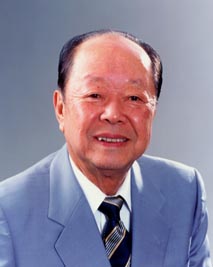
General elections were held in Japan on July 18, 1993 to elect the House of Representatives. The Liberal Democratic Party (LDP), in power since 1955, lost their majority in parliament. An eight-party coalition government was formed and headed by Morihiro Hosokawa, the leader of the Japan New Party (JNP).

Elections for the Japanese House of Councillors were held in Japan in 1980. On 16 May 1980, the Japan Socialist Party (JSP) brought no-confidence motion before the Diet relating to corruption issues, proposing more defense spending and rises in public utility charges as reasons for the House of Representatives to withdraw its backing from the government. Unexpectedly, 69 Liberal Democratic Party (LDP) members of the Diet from the Fukuda Takeo, Miki Takeo and Hidenao Nakagawa factions abstained from voting on the motion. The government was defeated by 56 votes in total of 243 and resigned. For the first time elections for both the House of Councillors and the House of Representatives were called in June 1980. In the elections of both the houses the LDP gained a perfect majority.

Kaoru Yosano was a Japanese politician. He was a member of the Liberal Democratic Party (LDP), the Sunrise Party of Japan and former member of the House of Representatives, serving his ninth term in the Lower House representing Tokyo's first electoral district until his defeat in the Japanese general election, 2009. Yosano was Chief Cabinet Secretary to Prime Minister Shinzō Abe from August 2007 to September 2007 and was Minister of Economic and Fiscal Policy in Tarō Asō's administration from February to September 2009.
A leadership election was held in the Liberal Democratic Party of Japan on 23 September 2007 after the incumbent party leader and Prime Minister of Japan Shinzō Abe announced that he would resign on 12 September 2007. Abe had only been elected to the post slightly less than a year earlier; his resignation came only three days after a new parliamentary session had begun. Abe said his unpopularity was hindering the passage of an anti-terrorism law, involving among other things Japan's continued military presence in Afghanistan. Party officials also said the embattled Prime Minister was suffering from poor health.
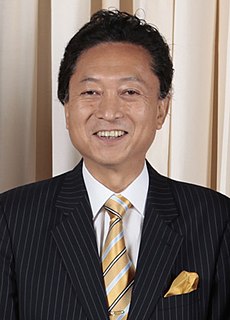
A general election for the Japanese House of Representatives was held on August 30, 2009. The opposition Democratic Party (DPJ) defeated the ruling coalition in a sweeping victory, winning 221 of the 300 electoral districts and receiving 42.4% of the proportional block votes for another 87 seats, a total of 308 seats to only 119 for the LDP.
The Liberal Democratic Party of Japan is the ruling party of Japan, with Party President Shinzō Abe being the Prime Minister of Japan. The Liberal Democratic Party is characterized by factionalism, where factions are sub-groups within a larger organisation. While factions characterize other political parties in Pacific Asia, Japanese factionalism is distinguished by its stability and institutionalization. Since the genesis of the Liberal Democratic Party in 1955, factions have existed, but they have changed over time. Despite this change, factions in the party today can be traced back to their 1955 roots, a testament to the stability and institutionalized nature of Liberal Democratic Party factions.
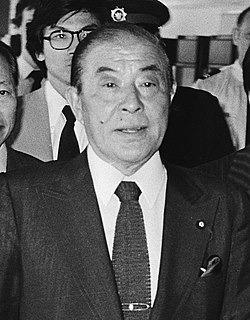
Sunao Sonoda was a leading Japanese Liberal Democratic Party (LDP) politician who served as foreign minister and health and welfare minister of Japan. He was called "flying foreign minister" due to his active diplomacy in increasing the role of Japan when he was in office. He was one of the significant figures in normalizing the relations between Japan and China.
